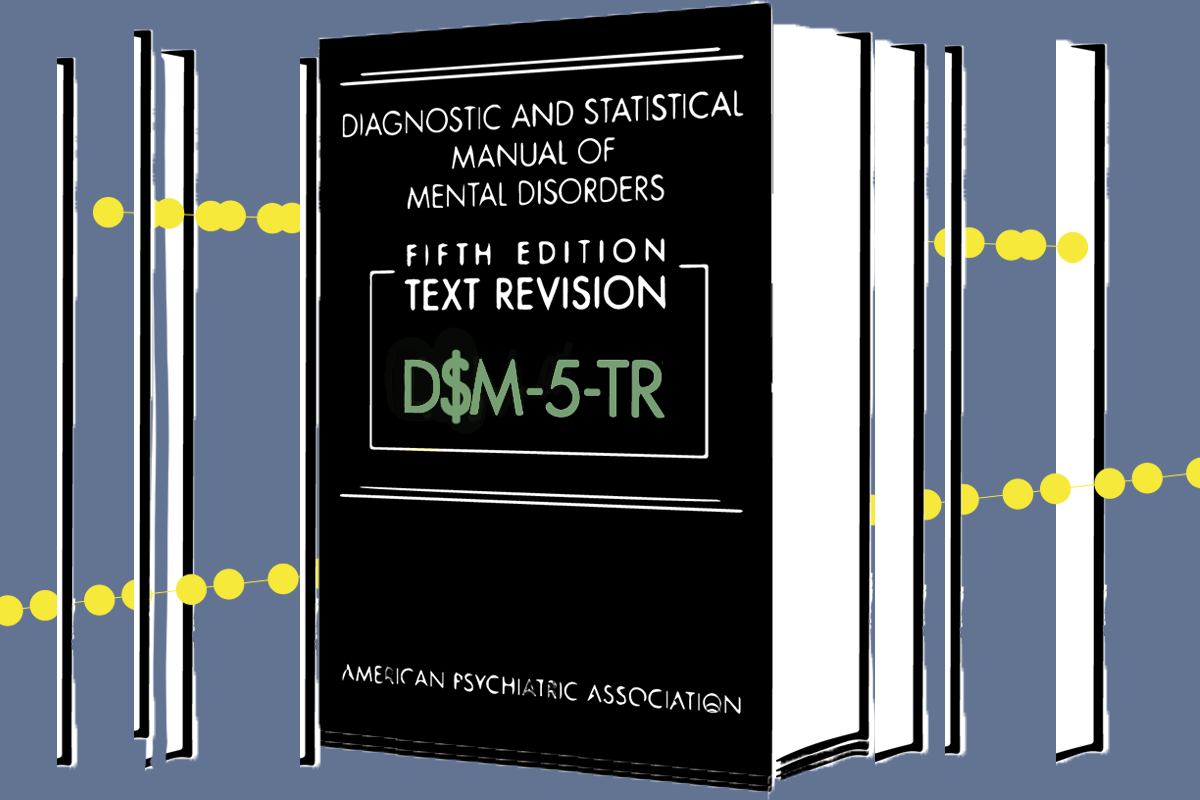Many of the physicians who worked on the current diagnostic and treatment guidelines for psychiatric conditions in the United States have financial ties to pharmaceutical companies, according to a study published today in The BMJ.
Nearly 60 percent of the 92 U.S.-based physicians who shepherded the Diagnostic and Statistical Manual of Mental Disorders, fifth edition, text revision (DSM-5-TR) accepted industry payments totaling $14.2 million during the three years prior to working on the manual, the study shows.
The results raise questions about systemic “economies of influence” over a document used by public health officials, health insurance plans and drug regulators, says lead investigator Lisa Cosgrove, professor of counseling and school psychology and a faculty fellow at the Applied Ethics Center at the University of Massachusetts, Boston.
“Financial conflicts of interest, industry ties don’t point to wrongdoing — we’re not saying that people did anything wrong consciously,” Cosgrove says. “It’s just implicit bias.”
DSM-5-TR decision-makers were not allowed to receive more than $5,000 from industry, according to a statement to The Transmitter by a spokesperson for the American Psychiatric Association (APA), which published the DSM-5-TR in March 2022. And an independent committee reviewed financial and non-financial disclosures for all other contributors to the revision.
The text revision centered on literature searches to incorporate new scientific findings since the publication of the DSM-5 in 2013, the spokesperson wrote.
“Any rare, minor instances of content that connected a diagnosis to a therapy were omitted from DSM-5-TR,” the spokesperson wrote. “No content was found in the submitted text that related to a specific treatment for which industry funding may have been provided for related research.”
C
osgrove and her colleagues documented potential financial conflicts of interest among the contributors to the original version of the DSM-5 as well as its predecessor, the DSM-IV. The DSM-5 study relied on publicly available disclosure forms submitted to the APA by participating members.The APA did not publicly post DSM-5-TR member disclosure documents. So Cosgrove and her colleagues used a publicly accessible federal government database called Open Payments to track how much drug and device manufacturers paid U.S.-based physicians between 2016 and 2019 — the year work began on the DSM-5-TR.
U.S.-based psychiatrists and other physicians accounted for 92 of 168 people who oversaw the DSM-5-TR or worked on the 20 chapters focused on groups of related disorders, such as medication-induced movement disorders or sleep-wake disorders.
A total of 55 of the 92 physicians — about 60 percent — had documented industry payments between 2016 and 2019. Remuneration totaled $14.2 million, 70.6 percent of which was labeled with the purpose of research.
Payments ranged from tens to millions of dollars per person. The 12-person group that worked on the medication-induced movement disorders chapter accounted for 60 percent of the total remuneration, or $8.4 million. One member of that group received $2.7 million. By contrast, the nine members of the group responsible for the chapter on sleep-wake disorders collectively received just under $2 million.
I
ncluding psychiatry experts who have industry ties was unavoidable, wrote Alan Schatzberg, the section editor of the medication-induced movement disorders chapter, in an email to The Transmitter. “Without using them it would be hard, if not impossible, to come up with the experts to make the necessary revisions,” wrote Schatzberg, who is professor of psychiatry and behavioral sciences at Stanford University and former APA president.Schatzberg wrote that he does not think industry payments affected the chapter content.
The former research director of the DSM-5, William Narrow, agrees. “To the extent that I can determine — and I was involved across all of these workgroups — I saw no evidence that decisions were made based on something that would benefit the industry,” says Narrow, who is now associate professor of psychiatry at Johns Hopkins School of Medicine in Baltimore, Maryland.
But Cosgrove says it remains unclear whether the financial ties to industry had any direct impact on the content of the DSM-5-TR because the APA did not make the revision process transparent. Without transcripts of committee meetings or public reports of reasoning, it’s impossible to assess the impact of industry on text revisions, she argues. “Even text revisions have changes that can be significant,” she says.
The finding that the majority of physicians received industry payments aligns with past studies on industry influence in other medical fields, says Aaron Mitchell, an oncologist and health services researcher at Memorial Sloan Kettering Cancer Center in New York City, who was not involved in the study. He says a more detailed distribution of the payments to DSM physicians would have teased apart the few who had received large industry payments or research grants from the many he suspects received no more than a free meal.
Cosgrove urges the APA to broaden DSM oversight to include, for example, medical anthropologists, whose training focuses on upstream influences on broad societal trends, and methodologists, who predict the impact of adjusting the disorder criteria on the larger population.





